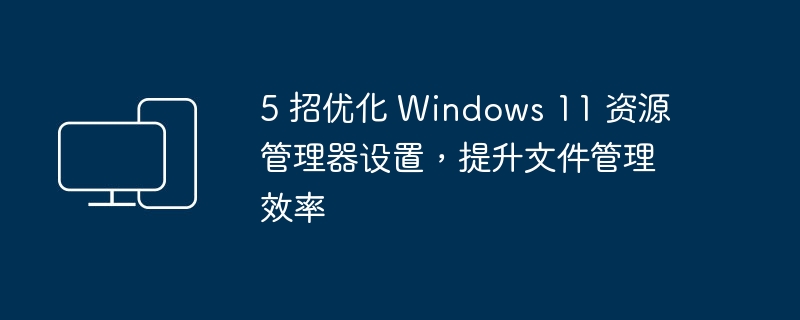

On Windows 11, the default settings of "Explorer" can already meet the needs of most users. But you know what? There are also some hidden settings that can make file management simpler and more efficient.
For example, you can:
Next, we will introduce 5 tips to help you improve the efficiency of using "Windows Explorer".
Showing file extensions can help you quickly distinguish file types and avoid errors when renaming. The steps are as follows:
1Use the Windows E shortcut key to open "Windows Explorer",
2 Click the "View" menu and select the "Show" option.
3 Check the "File name extension" option.
Open file extension
After completing the above steps, the file extension will be displayed directly, allowing you to see it at a glance.
In the "Gallery" view, you can add multiple picture folders to facilitate centralized display and unified management. The steps are as follows:
1Open "Explorer" and select "Gallery" in the left panel.
2 Click the "Collection" menu and select "Manage Collection".
Select "Manage Collection"
3 Click "Add" and select a new folder location.
Add or delete folder location
4 (Optional) To remove a location, click "Delete" after selecting it.
After completing the above operation, the resource manager will display all the pictures in the collection just like the "Photos" application.
Of course, you can also add network locations, including mapping to local network drives or UNC paths.
Pinning frequently used folders to the "Quick Access" area can greatly improve your work efficiency. The steps are as follows:
1Open "Explorer" and browse to your commonly used folders.
2 Click the "···" button on the toolbar, and then select "Pin to Quick Access".
Pin Folder to Quick Access
In this way, you can quickly access these folders in the left navigation bar and "Main Folder".
Open Folder with Quick Access
To avoid the "Quick Access" list from being too long, it is recommended to pin only the most commonly used folders. To remove, right-click on the folder and select "Unpin from Quick Access".
We can also pin the "Recycle Bin" to the "Quick Access" area for quick access. The steps are as follows:
1 Right-click an empty space on the desktop and select "Personalize", then select "Theme" > "Desktop Icon Settings".
2 Check "Recycle Bin" in the "Desktop Icon" option, and then click "Apply".
3 Right-click "Recycle Bin" on the desktop and select "Pin to Quick Access".
Pin "Recycle Bin" to quick access
After completing the above steps, you can quickly access the "Recycle Bin" in the resource manager to easily restore or clear files and free up system space.
Use Recycle Bin in Quick Access
By manually specifying folder types, you can optimize file management as needed. The steps are as follows:
1 Open "Explorer", right-click the folder that needs to be specified, and then select "Properties".
2 Click the "Customize" tab and select "General Items", "Documents", "Pictures", "Music" or "Video" in the "Optimize this Folder" drop-down list.
Set folder type
3 After clicking "OK", the settings will take effect immediately.
Such customization not only makes folders easier to visually identify, but also optimizes browsing speed based on file types and improves the user experience. If you do not specify it manually, Windows will automatically recognize the folder type, but it will consume additional system resources.
This article introduces 5 tips for optimizing Windows 11 Explorer settings, which can make your file management easier and more efficient.
The above is the detailed content of 5 tips to optimize Windows 11 Explorer settings and improve file management efficiency. For more information, please follow other related articles on the PHP Chinese website!




